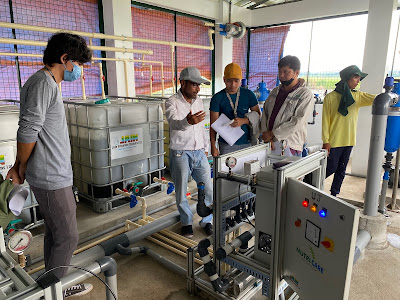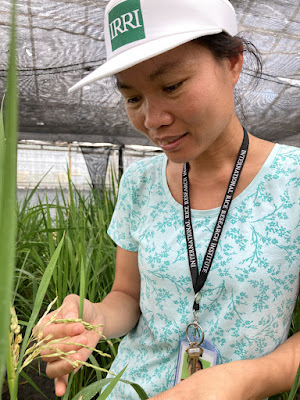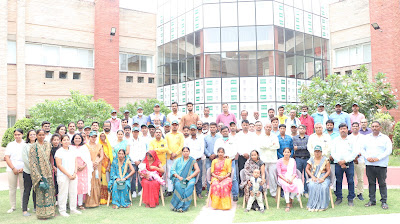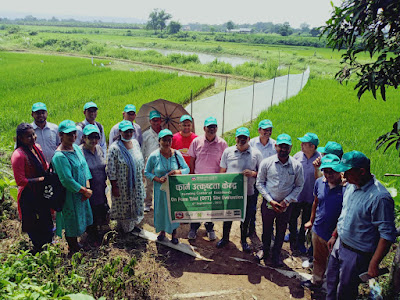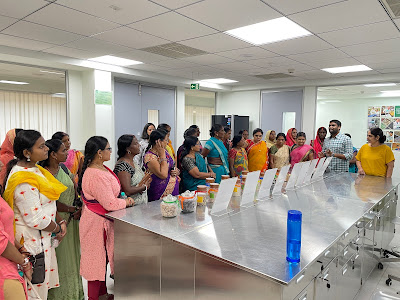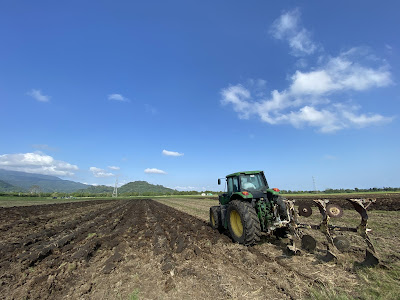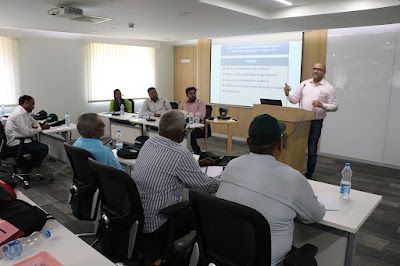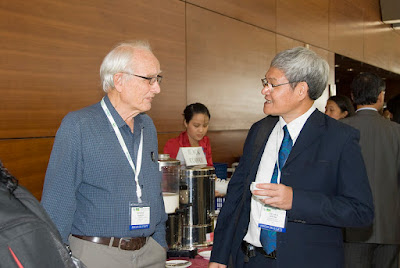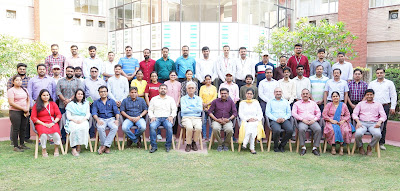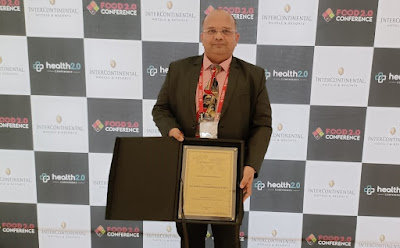The CGIAR Initiative Seed Equal- Delivering Genetic Gains to Farmers Fields held a workshop in Kenya, Africa to share how the initiative can contribute to developing more effective seed systems for potato crops in the region.
Pages
Thursday, December 22, 2022
Bangladesh women-led seed producer groups complete end-to-end seed training
The Bangabandhu Sheikh Mujibur Rahman Science and Technology University (BSMRSTU), Seed Certification Agency (SCA), an institute under the Bangladesh Ministry of Agriculture, and International Rice Research Institute (IRRI) conducted a hands-on training on rice seed production, processing, storage and certification at the SCA Institute in Gazipur last December 21 and 22, 2022. The goal was to train 70 women ToT (Trainer of Trainees) farmers from different women-led farmers groups. Mr. Aminul Islam, Director of SCA, was the chief guest and Dr. Md. Hasanul Kabir Kamali, Chief Seed Technologist of SCA, was the chairperson.
Wednesday, December 21, 2022
ISARC organizes crop residue management workshop
ISARC organized a three-day crop residue management workshop on using a compost turner from 15 to 17 December 2022. The workshop was organized with technical support from Nong Lam University (NLU), Vietnam.
Monday, December 19, 2022
RBI Risk Management officers map out business continuity plans
In an effort to align towards a more efficient business process for 2023, the Risk Management (RM) team of the Rice Breeding Innovations (RBI) platform reconnected to conduct risk assessments and update their business continuity plans during the RM Annual Planning Workshop at the IRRI Guest House on 09 Dec 2022. RM Officers from the different units of RBI participated in the workshop facilitated by IRRI’s Risk Management Unit, led by Senior Manager Marichu Bernardo and Enrico Mercado.
Friday, December 16, 2022
IRRI, RDA hold seed systems training for researchers and extension workers in Asia
In partnership with the Rural Development Administration (RDA) of Korea, the International Rice Research Institute Education (IRRI Education) implemented a capacity development program on seed production on 23-29 November 2022 at IRRI headquarters in the Philippines.
Thursday, December 15, 2022
ISARC conducts Learning and Exposure Visit for BSc Agriculture Students of BHU
Last November, the IRRI South Asia Regional Centre (ISARC) in Varanasi organized and hosted learning and exposure visits for 164 final year Bsc Agriculture students of Banaras Hindu University (BHU) under the Student Ready Programme of the Indian Council of Agricultural Research (ICAR).
Wednesday, December 14, 2022
RDA and IRRI host seed production course for Bangladesh women farmers’ groups
The Rural Development Academy (RDA) and International Rice Research Institute (IRRI) conducted a training course on seed production, quality control, processing, and marketing for 60 women-led farmers groups on 28 – 29 November 2022 in Bogura District.
The course provided the participating women with classroom and hands-on training on seed production, different seed quality characteristics, processing, storage, packaging, and marketing. Mechanized System Rice Intensification procedure and seed licensing and registration procedures were also covered.
The activity is jointly implemented by RDA and IRRI in northern Bangladesh under the Accelerated Genetic Gain in Rice (AGGRi) Alliance. AGGRi collects robust data and verifies the suitability of promising modern high-yielding rice varieties for specific regions; compares the performance of popular varieties with candidate products; accelerates the expansion of candidate products at the field level, and collects farmers’ feedback.
RDA is a specialized autonomous rural development government institution in Sherpur Upazila in Bogra for training, research, and action research. The institution is officiated with the Rural Development and Co-operatives Division of the Ministry of Local Government, Rural Development & Co-operatives.
The guests from RDA Bogura included Director Md Khalid Aurangozeb, Assistant Director Fakar Uddin Talukdar, Additional Director Dr. Abdullah Al Mamun, and Training Director Md. Ferdous Hossain Khan.
Also attending the event were Dr. Daniel Menge, scientist, and Muhammad Ashraful Habib, senior specialist, from IRRI Seed Systems.
District Seed Certification Officer Mr. Shaduzzaman from the Seed Certification Agency, Bogura served as the resource person. The program was moderated by Mr. Md. Mozaharul Haque, RDA agricultural consultant in Bogura.
In 2022, The IRRI Bangladesh Seed System Team, in collaboration with other complimenting initiatives, conducted seed production of promising varieties, promoted new varieties in the farmers’ network, and carried out demonstrations through women farmers’ groups formed by IRRI’s networking partners in Bangladesh.
###
Learn more about IRRI (www.irri.org) or follow us on social media and networks (all links down the right column).
Monday, December 12, 2022
Farmers in Uttar Pradesh learn about rice wheat systems and digital tools for sustainable rice production
22 November 2022, Varanasi - IRRI South Asia Regional Center (ISARC), Varanasi conducted a one-day capacity development orientation program for farmers and extension workers of Sonbhadra district, Uttar Pradesh as a part of collaboration between IRRI & the ‘Jeetega Kisan’ project.
IRRI and BAU hold capacity development training for farmers on climate resilient agriculture
21st November 2022, ISARC, Varanasi: As a part of the ongoing collaboration between IRRI and Bihar Agriculture University (BAU) under the Climate Resilient Agriculture Initiative of the Government of Bihar, a three day face to face training program centered around rice post-production practices was conducted at IRRI South Asia Regional Center (ISARC), Varanasi from 19 - 21 October 2022.
Tuesday, December 6, 2022
IRRI scholar takes 1st place at the International Conference in Biology and Biochemistry
His passion for developing and determining nutritionally dense rice paid off when Rhowell Tiozon and his study on rice’s anti-diabetic and cancer properties won first place in a poster competition at the 49th Philippine Society of Biology and Biochemistry (PSBMB) Annual Convention on 23-26 November.
Thursday, December 1, 2022
A multi-stakeholder dialogue on inclusive digital tools for rice sustainability in Vietnam
To provide a platform for dialogue among the stakeholders on the challenges of reaching Vietnamese smallholder farmers with digital tools, the International Rice Research Institute (IRRI) organized a webinar titled ‘Improving Rice Sustainability through Digital Tools’. Part of the Inclusive Digital Tools to Enable Climate-informed Agroecological Transitions (also known as TRANSITIONS) project, funded by the International Fund for Agricultural Development (IFAD). The webinar identified the opportunities for improving access and use of digital tools and tailoring the services to meet the needs of farmers through inclusive co-creation of digital tools in rice production.
Monday, November 21, 2022
ISARC organizes climate-resilient agriculture program for officials of Odisha Department of Agriculture and Farmers Empowerment
Varanasi, 11 November 2022: The International Rice Research Institute South Asia Regional Centre (ISARC) and the Odisha Government organized a program for the Department of Agriculture and Farmers Empowerment (DA&FE) officials towards developing and promoting climate resilience in the state’s agriculture sector.
Wednesday, November 16, 2022
Learning session with Bangladesh stakeholders highlights short-duration and cold-tolerant high-yielding rice varieties for Haor areas
During the dry winter boro season, the Haor regions in the districts of Kishoreganj, Netrakona, Habiganj, Sylhet, and Sunamganj, Bangladesh, suffer from sudden flash floods almost every four years and the annual extreme winter cold. As a result, boro rice, which is more than half of Bangladesh’s rice production, suffered significant damage. Rice researchers and scientists propose developing short-duration, cold-tolerant, high-yielding rice varieties (HYV) to address the demands for boro rice cultivation in the Haor region.
Thursday, November 10, 2022
Scientists convened to speed up new high quality rice varieties for Haor regions of Bangladesh
To speed up the release of high-quality rice varieties in Bangladesh, seventy scientists from different research institutions and partners convened to discuss research findings and consolidate activities for 2023 during the Annual Review and Planning Workshop for “Development of Short-Duration Cold Tolerant Rice Varieties for Haor Areas of Bangladesh” on 10 October in Gazipur, Bangladesh.
Wednesday, November 9, 2022
IRRI, Philippine Agriculture Department open 5th rice research-to-production course for government researchers and extension agents
The International Rice Research Institute (IRRI) and the Philippine Department of Agriculture (DA), opened the fifth Rice: Research To Production (RR2P) capacity development course for research and extension staff of the DA and its attached agencies, local government units, and state universities and colleges on 7 November 2022.
Tuesday, November 8, 2022
Rice Breeding Innovations team learns about mechanized irrigation system for direct-seeded rice
Amid a climate crisis, it remains a challenge to meet the increasing global demand for rice. Direct-seeded rice (DSR) aims to reduce the environmental impact of rice production by producing rice efficiently with less labor, water, energy, and agrochemicals. It is a major undertaking for the International Rice Research Institute (IRRI).
Friday, November 4, 2022
Strategies for Native Trait Development discussed during the RBI Leadership Team Planning Meeting
>
As part of the efforts to further strengthen IRRI’s breeding team and mission, the Rice Breeding Innovations (RBI) Platform Leadership Team convened to map out strategies for native trait deployment on September 29.
Wednesday, November 2, 2022
Asian Mega-Deltas Initiative builds learning alliance to address climate change issues in the Mekong Delta
IRRI relaunches its nematode program to address demands for direct seeded rice
The rice root-knot nematode (RKN), Meloidogyne graminicola, is one of the most destructive species of nematodes causing yield losses ranging from 28 to 87%. RKN forms hook-like galls on the roots, and in cases of severe nematode infestation, it results in yellowing and stunting of rice plants.
Several studies suggest that the shift from irrigated rice to water-saving cropping practices, as a response to the decreasing availability of water and agricultural labor, favor RKN. Sustainable management of nematodes in these rice production systems involves the use of resistant or tolerant varieties, control of alternate hosts, crop rotation, and biological control.
Recognizing the increasing importance of RKN, particularly in direct seeded rice (DSR), the International Rice Research Institute (IRRI) is reactivating its research activities in nematology. As part of this effort, research staff of the Sustainable Impact through Rice-Based Systems and Rice Breeding Innovations Platforms attended the Training on Basic Methods for Research on the Rice Root-Knot Nematode on 17-21 October 2022 to learn how to identify RKN based on its morphology and plant symptoms and mass produce and extract RKN from root and soil samples. Participants were also trained on how to standardize the inoculum, and phenotyping methods for screening germplasm for resistance or tolerance to RKN.
Dr. Marita S. Pinili, Senior Plant Virologist and Phytonematologist and Head, Pest Management Division of University of the Philippines Los Baños served as the training facilitator, and Dr. Nancy Castilla of IRRI was the coordinator. At the end of the training, the participants presented the results and lessons learned during the practical exercises in the laboratory, greenhouse, and field.
The RKN research activities are important to the IRRI’s DSR project which is seen to be one of the most efficient, sustainable, and economically-viable rice production systems used today. RKN is found in diverse rice ecosystems, but is most destructive in rainfed and upland rice in South and Southeast Asia. It also occurs in North and South America, Europe and Africa.
###
Learn more about IRRI (www.irri.org) or follow us on social media and networks (all links down the right column).
Wednesday, October 26, 2022
Breeding Program Modernization: Empowering NARES to transform breeding in East and South Africa
Saturday, October 22, 2022
IRRI and Government of Odisha facilitate adoption of direct-seeded rice technology through stakeholder convergence along with gender and youth inclusion
Monday, October 17, 2022
Get to know an IRRI Scientist: Van Schepler Luu, Lead of Plant Pathology and Host Plant Resistance Group
Friday, October 14, 2022
IRRI visiting scholar wins 1st place at the Pennsylvania State University Biology Student Research Showcase 2022
Tuesday, October 4, 2022
IRRI and Assam Agricultural University release rice production digital tools for rice farmers, researchers, extension agents, and policymakers
Wednesday, September 28, 2022
IRRI organises an orientation among farmers and extension workers for sustainable rice production system in India
ISARC organizes training on conservation agriculture for rice-based systems to improve paddy production in Madhya Pradesh
Women farmers and extension agents from Grameen Mitra learn about sustainable rice production systems
KVK-CSISA Network plan next initiatives
Facilitating the adoption of new rice varieties in Nepal to benefit farmers, consumers, and national economy
Tuesday, September 20, 2022
MSc Sandwich Research Program Opportunities are now offered to Filipino students
Wednesday, September 14, 2022
Women farmers from Bihar participate in modern rice production training at IRRI South Asia Regional Centre
IRRI Nepal and FWU train young scientists to strengthen research design and data analytics in the face of climate change
 |
| Participants and dignitaries of the training program at the inaugural session in front of Faculty of Agriculture, FWU, Tikapur, Kailai |

%20(1).jpg)






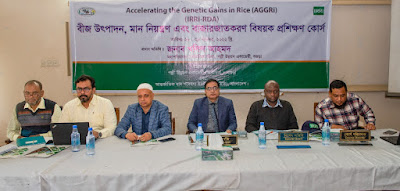




.jpg)




%20(2).png)
